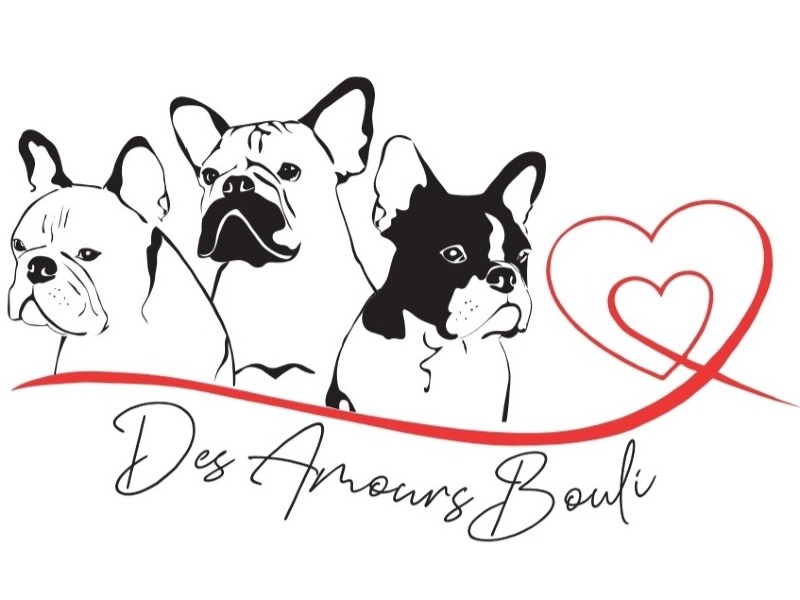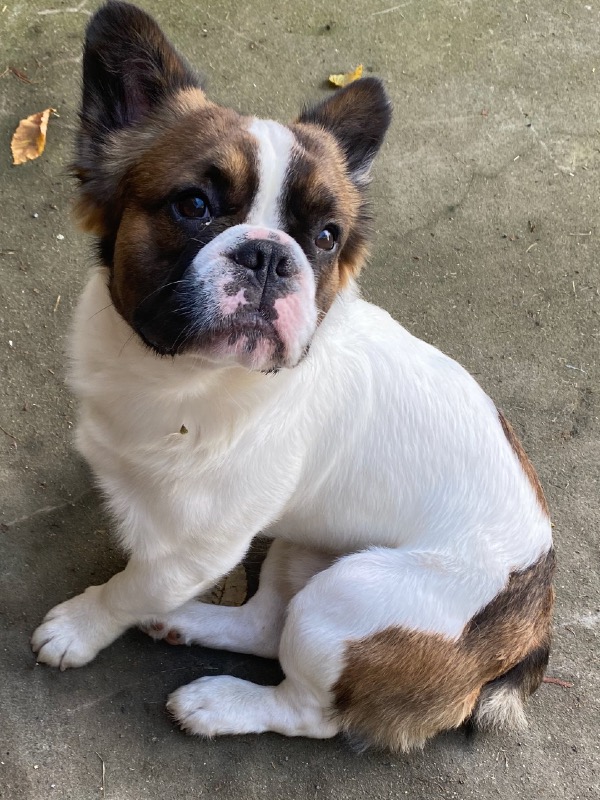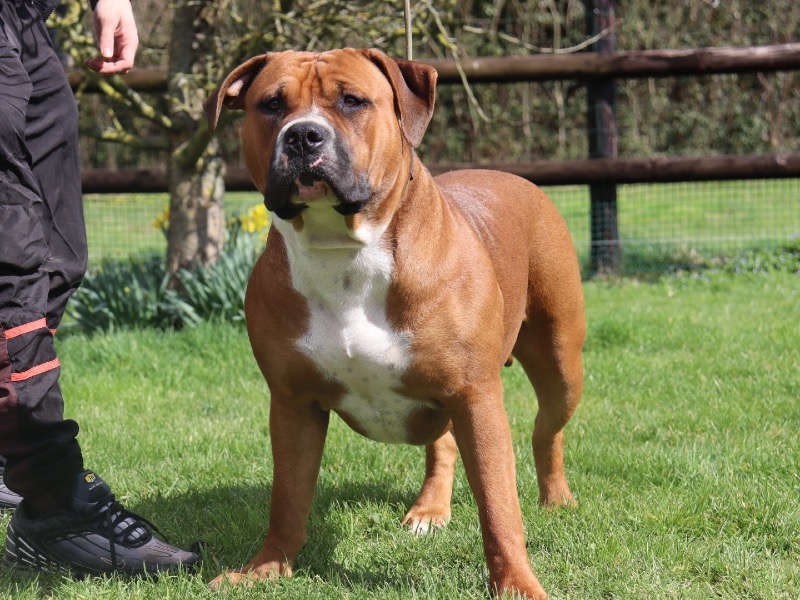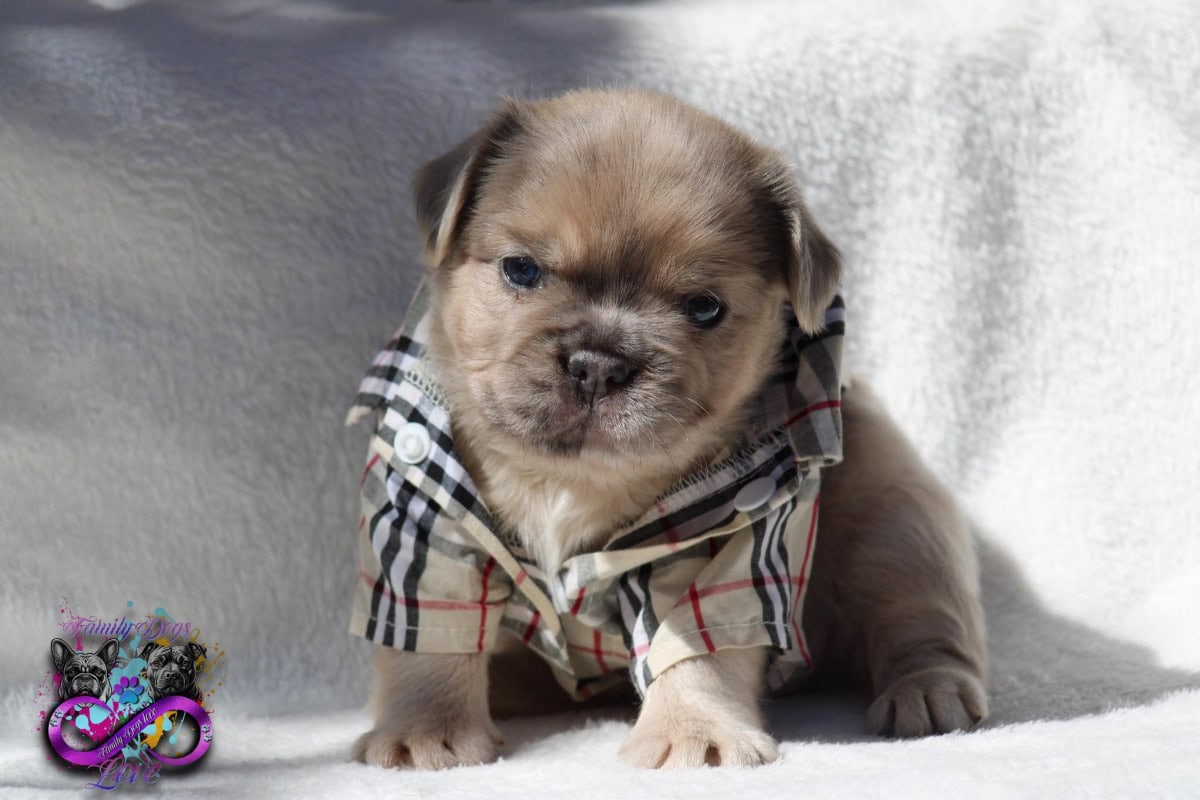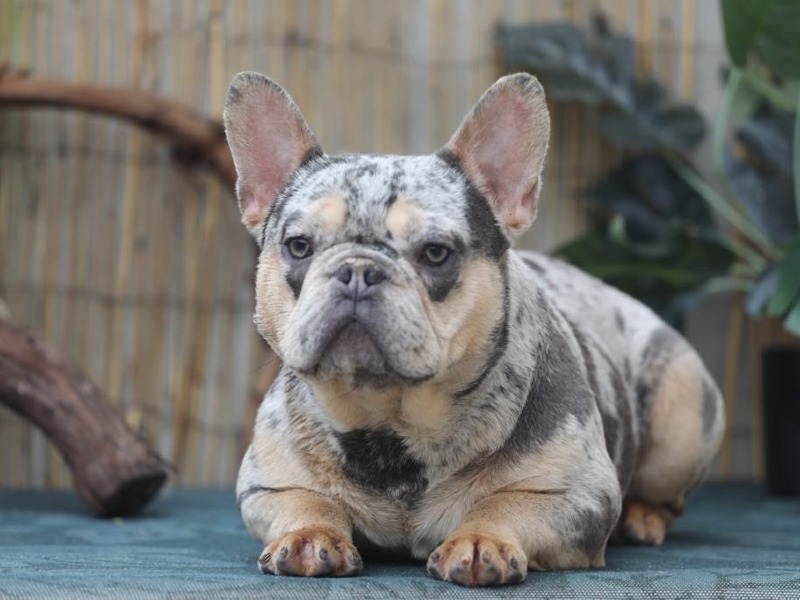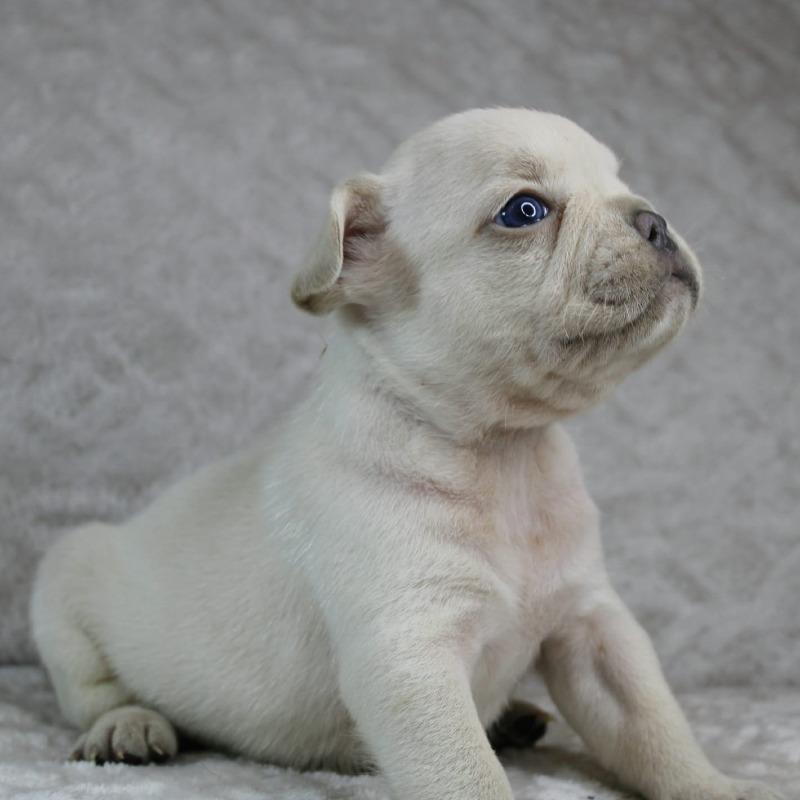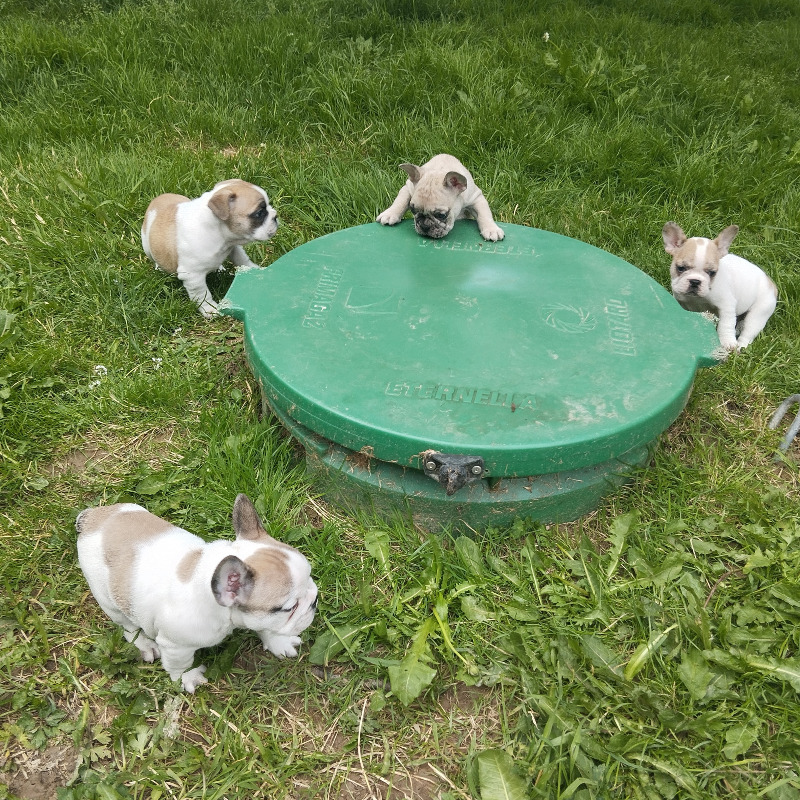French bulldog
Autres noms : Frenchie, Bulldog french
Discover the French Bulldog, a loving and playful companion with a charming character. With its unique appearance, large ears, and mischievous attitude, this small dog is perfect for apartment living and will win the hearts of the whole family.
Awareness of acquiring an animal
Adopting or breeding a dog is a responsibility that must be carefully considered. Dogs are loyal companions that require time, attention, and constant care. Whether for leisure, passion, or professional breeding, it is crucial to understand the specific needs of each breed. Provide them with a loving and stimulating environment, and avoid any impulsive acquisition that could harm their well-being. Be a vigilant and committed owner for a happy and healthy companion.
To learn more about animal welfare, we invite you to consult our FAQ by clicking the button below:
Origins and history
The French Bulldog is a breed of dog that has its origins in England, where breeders began developing small bulldogs during the 19th century. These small dogs were popular among textile workers in Nottingham, who used them as companion animals. At that time, these animals were already valued for their friendly temperament and compact size.
With industrialization, many artisans emigrated to France, bringing their small bulldogs with them. Once in France, these dogs generated increasing enthusiasm, particularly in Paris, where they became popular among the bourgeois and artists. French breeders began to refine the breed, aiming for a more sociable temperament and a specific physical appearance, including "bat ears" that became iconic.
Over the decades, the French Bulldog gained fame around the world. Its affectionate character and ability to adapt to an urban lifestyle made it a beloved companion. Today, it is famous for its vibrant personality and distinctive appearance, gaining followers in many households across the globe.
Physical characteristics
The French Bulldog is a small dog with a compact and muscular body. Its stature is robust, with a height at the withers typically ranging between 30 and 33 centimeters. The ideal weight is between 8 and 14 kilograms, making it an easy companion to carry. This breed is distinguished by its wide, rounded head, featuring a flat forehead and prominent cheeks that give it a gentle and friendly expression.
The ears are a striking characteristic, being large and erect, with a bat-like shape. The eyes, round and well-spaced, are often dark in color, adding to its charm. The nose is short and black, contributing to its distinctive appearance. The tail is generally short and can be straight or curled.
The coat is short, smooth, and silky, with a varied color palette including fawn, brindle, and black and white. The texture of its coat is pleasant to the touch, and it requires little maintenance. Overall, the French Bulldog embodies the perfect blend of robustness and gentleness, making it particularly appealing.
Character
The French Bulldog is a loyal and affectionate companion, whose temperament makes it a popular pet. This dog is known for its sociable nature and its strong ability to bond with its owners. It excels in family interactions and generally gets along well with children, making it a wise choice for families.
With a lively personality, this dog can sometimes be mischievous and playful. It loves to have fun and participate in activities with its surroundings. Its natural curiosity drives it to explore its environment, and it can display a jovial and friendly demeanor towards other animals, provided it receives proper socialization from a young age.
Despite its playful character, it can be a bit stubborn, which requires patient and positive training methods. This dog is generally adaptable to different living situations, whether living in an apartment or in a house with a garden. Its exercise needs are moderate, but it enjoys regular walks to expend energy. In summary, the French Bulldog is an animal with a tender heart, ready to bring joy and companionship to its owners.
Life expectancy
The life expectancy of a French Bulldog generally ranges between 10 and 14 years. However, several factors can influence this longevity, including genetics, diet, exercise, and veterinary care.
Common health issues related to the breed can also impact their lifespan. Due to their flat-faced morphology, these dogs are often prone to respiratory problems. Conditions like brachycephalic syndrome can lead to breathing difficulties, especially during hot weather or intense exercise. Additionally, they are also predisposed to dermatological and joint issues.
Regular check-ups with the veterinarian are essential for quickly detecting and treating health problems. A balanced diet and physical activity tailored to their abilities can also contribute to a longer and healthier life. Therefore, it is crucial to consider these elements to ensure optimal well-being for these loyal companions.
Exercise and activity needs
The French Bulldog is a dog breed that requires special attention when it comes to exercise and physical activity. Although this dog is often seen as a lazy companion animal, it needs regular stimulation to stay healthy and happy. Due to its morphology, its endurance capacity is limited, and prolonged or intense exertion can be detrimental.
Daily walks are essential and should last between 20 and 30 minutes. It is best to divide them into several short sessions to avoid excessive fatigue. Playful activities such as fetch or agility exercises are also beneficial, allowing the dog to have fun while developing its motor skills.
It is crucial to avoid exercising during hot weather, as the French Bulldog is sensitive to heat due to its respiratory structure. Indoor games can be set up to meet its activity needs when it's too hot outside. In summary, a balanced routine that includes walks, playtime, and rest periods will contribute to its overall well-being.
Recommended diet
The diet of a French Bulldog must be carefully balanced to meet its specific needs. Due to its morphology, this dog is predisposed to certain health issues, including hip dysplasia and respiratory problems. Therefore, it is essential to provide high-quality food that is rich in animal proteins to promote good muscle development.
The kibble should be suitable for its size and age, prioritizing those formulated for small breeds. An intake of omega-3 and omega-6 fatty acids is beneficial for the skin and coat. Additionally, it is advisable to choose foods that contain fiber to aid digestion, thus reducing the risk of gastric issues.
It is preferable to divide meals into several small portions throughout the day to avoid digestive disturbances. Due to its tendency to gain weight, it is crucial to monitor the quantities given and avoid excessive treats. Lastly, proper hydration is vital, so ensure that it always has access to fresh water. A well-suited diet will contribute to the health and overall well-being of the French Bulldog.
Training and obedience
Training and educating a French bulldog requires a thoughtful approach tailored to their personality. These dogs are known for their joyful and affectionate nature, but they can also display a tendency towards independence. It is essential to implement a positive method based on rewards, as punishments can be counterproductive.
Start with short and frequent training sessions, ideally lasting 5 to 10 minutes. These dogs have a limited attention span, so brief sessions will help maintain their engagement. Include interactive games and exercises that stimulate both their minds and their bodies.
Socialization is another crucial aspect. Expose them from a young age to different people, animals, and environments to avoid timid or aggressive behaviors. This early step will help build a balanced temperament.
Finally, be consistent and patient throughout the process. Positive reinforcement and repetition help build a relationship of trust and mutual affection, thereby facilitating learning and adherence to rules. A well-trained French bulldog will be a happy and serene companion.
Behavior with children
The French Bulldog is a dog breed known for its friendly and affectionate nature, making it a popular companion for families with children. Their playful temperament and moderate energy levels generally make them well-suited for interaction with younger ones. They are often very social and eager to participate in family activities, which can strengthen the bonds with children.
However, it is essential to monitor the interactions between the French Bulldog and children. Although these dogs are usually patient and tolerant, their small size can make them vulnerable to sudden or unexpected movements. Educating children on how to approach and handle a dog is crucial to ensure everyone's safety. By learning to respect the dog's space, children can enjoy a harmonious relationship with their companion.
French Bulldogs can also play a calming role for children, providing comfort and companionship. Their affectionate nature allows them to form strong bonds with family members. Nevertheless, it is important to remember that, as with any animal, proper socialization and training are essential for them to thrive as family members. In summary, this dog breed can be a wonderful addition to a home with children, as long as interactions are guided and respectful.
Compatibility with Other Animals
The French bulldog is generally known for its friendly and sociable personality, making it a good companion for other pets. Their calm temperament and affection towards humans can help establish positive relationships with animals such as cats and other dogs. However, integrating a French bulldog into a household with other animals will largely depend on early socialization and the individual experiences of each dog.
Socialization is crucial. It is essential to expose the bulldog to other animals from a young age so that it learns to interact appropriately. A well-socialized dog will be more willing to live harmoniously with other pets, while a bulldog that hasn’t had that opportunity may exhibit jealousy or territorial behaviors.
Regarding cats, the French bulldog often has a friendly attitude. However, some dogs may have a strong hunting instinct, which can make cohabitation with cats more challenging. Gradual and monitored introduction sessions are recommended to ensure successful coexistence. It is also important to allow each animal to have its own space to prevent stress and conflicts. In summary, with proper socialization and appropriate introductions, a French bulldog can thrive in a home with other animals.
Grooming needs
The French Bulldog is a dog breed that requires specific maintenance due to its unique morphology. Its wrinkled skin and short coat present both advantages and challenges in terms of grooming.
First of all, regular grooming is essential to maintain the health of its skin. The skin folds need to be cleaned frequently to prevent the buildup of moisture and dirt, which could lead to irritations or infections. It is recommended to use a soft, non-irritating cloth to wipe each skin fold, as well as to occasionally apply a specific dog moisturizer if necessary.
Regarding the coat, weekly brushing is generally sufficient to remove dead hair and reduce shedding. The French Bulldog sheds moderately, so regular brushing helps keep the home clean. Bathing should not be done too often, as it can dry out the skin; once every two to three months is usually appropriate.
Finally, the ears and teeth also require special attention. It is advisable to check the ears for any signs of infection and to clean the teeth regularly to prevent tartar buildup. By adhering to these maintenance needs, one ensures optimal well-being for this beloved breed.
Health
The French Bulldog is a popular dog breed, but it has certain health-related characteristics. One of the main concerns is brachycephaly, a condition linked to the flattened shape of its muzzle. This feature often makes breathing difficult, leading to issues with apnea and temperature regulation. Owners need to be attentive to signs of respiratory distress, especially in hot and humid weather.
Another aspect to consider is the predisposition to obesity. These dogs, due to their morphology, have a tendency to gain weight, which can exacerbate other health issues. A balanced diet and regular physical activity are essential for maintaining their ideal weight.
Finally, dermatological and ocular problems can also arise. The skin folds require special attention to avoid infections, and certain eye diseases like cataracts and retinal issues are more common in this breed. Regular visits to the vet and close monitoring can help ensure their well-being and anticipate potential health problems.
Environment and habitat
The French Bulldog is a dog breed particularly suited for urban living. Its small size makes it an ideal companion for apartments and houses with limited space. However, even though they adapt well to an indoor environment, these dogs need regular activities to stay healthy.
Regarding their habitat, it is essential to provide them with a secure and comfortable environment. They enjoy places where they can interact with their owners, whether indoors or outdoors. It is best to avoid extreme climates, as their brachycephalic physique makes them sensitive to heat and cold. A closed space for outdoor activities, such as a secure garden, is ideal for allowing them to play safely.
Socially, these dogs are generally friendly towards other animals and humans, making their integration into a family home relatively easy. In summary, although the French Bulldog feels at home in an urban habitat, it requires special attention to its environment and daily activities.
Name ideas
Choosing a name for a French bulldog is an important task that should reflect the personality and unique character of the dog. A good name should be easy to pronounce and remember, both for the dog and its owner. Opt for a short name, preferably one or two syllables, which will make it easier for your pet to recognize. Also, think about the intonation and sound: a name that contains high-pitched sounds can attract the dog's attention.
At the same time, it’s essential to consider the temperament and appearance of your French bulldog. Whether your companion is playful, affectionate, or stubborn, the name can reflect these traits. Feel free to draw inspiration from pop culture, movie characters, or gastronomy, as these elements can give a unique and personal touch to the name.
Here is a selection of suggestions: Choco, Bibi, Loulou, Coco, Gigi, Zizou, Titi, Moka, Fifi, Toto, Doudou, Nino, Pipo, Toupie, and Poupette. These names are charming and simple, perfect for a French bulldog. Choose the one that resonates with you the most and suits your faithful companion.
Average purchase price
The price of a purebred dog can vary significantly depending on several factors. For French bulldogs, the average cost of a puppy generally ranges from 1500 to 4000 euros. This price largely depends on the reputation of the breeder, the pedigree of the parents, and the living conditions of the animals.
Quality breeders who offer health guarantees may charge higher prices. Puppies from champion bloodlines or with specific sought-after traits may see their prices increase. Therefore, it is essential to turn to responsible breeders who prioritize animal welfare.
Beyond the initial purchase price, it is important to consider the ongoing expenses associated with caring for a dog. These costs include food, veterinary care, as well as expenses related to training and socialization. In summary, owning a dog represents a long-term financial commitment that should be carefully assessed before making a decision.
Expenses
Owning a French Bulldog entails a certain financial commitment. On average, monthly expenses can range from €100 to €200, although this can vary based on several factors.
First of all, food represents a significant portion of the budget. For a dog of this size, it is advisable to opt for quality kibble, which can cost between €30 and €70 per month. A good diet is essential to maintain the health and vitality of the animal.
Next, veterinary care is another notable expense. Annual health check-ups and vaccinations typically cost between €50 and €100 per year. It may be wise to set aside an additional monthly amount of €10 to €20 for unexpected health issues, such as illnesses or accidents.
Hygiene products, such as shampoos, brushes, and ear cleaning, also represent an additional cost, estimated at between €10 and €15 per month. Finally, accessories like toys, leashes, and beds should also be considered, adding approximately €5 to €15 to the budget.
In summary, for a French Bulldog owner, anticipating a monthly budget between €100 and €200 allows for meeting the essential needs of the animal while ensuring its well-being.
Destination and usage
The French Bulldog is a breed of dog particularly cherished as a companion animal. Its sociable and affectionate personality makes it an ideal companion for families and individuals living alone. These dogs are known for their gentle nature and their ability to adapt to various environments, whether in city apartments or houses with gardens. Their compact size makes them easy to keep without requiring large spaces.
In terms of purpose, the French Bulldog excels as a pet. They provide a warm and comforting presence, making them a common choice for those seeking companionship. Their calm temperament is ideal for households with children, as they are generally patient and tolerant. Moreover, these dogs are known for their sensitivity and ability to form strong bonds with their owners, thus offering valuable emotional support.
They are also often present in activities such as park walks or visits to friends, where their friendly and sociable nature shines. Their curious and playful behavior makes them even more appealing, as they engage in their owners' daily lives, bringing joy and entertainment. In summary, the French Bulldog is much more than just a pet; it becomes a true family member, bringing love and happiness to everyday life.
Legislation and regulation
Legislation and regulations concerning purebred dogs vary around the world, and the French Bulldog is no exception to this trend. In several European countries, strict rules apply to the ownership of this breed due to health-related concerns. In France, for instance, considerations regarding brachycephaly, which affects the dogs' breathing, have led veterinarians and breeders to promote responsible breeding practices.
In contrast, in countries like the United States, laws are often less restrictive. However, some cities may ban breeds considered problematic, especially regarding dogs with health issues related to their morphology. This has led to awareness campaigns aimed at educating owners about their responsibilities.
Other nations, such as certain Asian countries, may impose specific requirements such as breeding licenses and health certificates for dogs of this breed. Finally, it is important to note that regulations are constantly evolving in response to recent studies on animal welfare and dog health, leading to changes in the perception and legislation surrounding this breed.
Official recognition
The French Bulldog is a dog breed that has gained popularity in many countries around the world. In most Western nations, it is recognized by official canine organizations, such as the Fédération Cynologique Internationale (FCI) and the American Kennel Club (AKC). These organizations establish breed standards, defining physical, behavioral, and health characteristics.
In Europe, the recognition of this breed is generally well established. In France, its country of origin, the French Bulldog receives particular attention, with dedicated breeders working to preserve its distinctive traits. Many European countries, including Germany and the United Kingdom, also have breed clubs that support breeders and owners.
However, this breed faces health challenges related to its morphology. In certain regions, debates have emerged regarding the ethical responsibility of breeding brachycephalic dogs. This has led to restrictions in breeding practices in some countries, prioritizing the health and well-being of the animals. Thus, while the official recognition of this breed is largely favorable, discussions surround its ethical implications in the contemporary world.
Pedigrees
To obtain a pedigree for a French bulldog, it is essential to contact recognized organizations in the field of dog breeding. In France, the Société Centrale Canine (SCC) is the main entity responsible for the registration of purebred dogs. This organization is responsible for evaluating bloodlines and provides official pedigrees, ensuring traceability and compliance with breed standards.
There are also breed clubs, such as the French Bulldog Club, which work to promote and preserve this breed. These clubs organize events, exhibitions, and competitions where dogs can be judged according to breed criteria, thus contributing to the improvement of bloodlines. By becoming a member of such a club, French bulldog owners can benefit from advice on breeding and the health of their animals, while also accessing resources for obtaining pedigrees.
Finally, it is important to ensure that the breeder is registered with these organizations and clubs to guarantee the legality and quality of the documents issued. Good communication with professionals and enthusiasts of the breed ensures that the dogs are bred in accordance with standards, thereby contributing to the longevity of the French bulldog.
Prohibitions
The French bulldog is a popular dog breed in many countries, but it also faces growing controversies and bans due to concerns about health and well-being. In some countries, authorities classify this breed among those considered likely to pose issues due to their physical characteristics, particularly their respiratory difficulties.
In several regions, regulations aim to limit the breeding of these dogs in order to reduce the incidence of associated health problems. For example, some European countries have enacted laws banning the sale of puppies from lines exhibiting extreme traits that exacerbate conditions like brachycephaly. This increased attention to animal health has led to debates about the ethics of breeding such breeds.
Additionally, some municipalities may impose specific restrictions, ranging from the necessity of a permit to an outright ban on owning this breed. These measures aim to protect the animals and raise public awareness about the risks associated with unregulated breeding. Thus, the situation of the French bulldog varies significantly depending on local legislation, highlighting a movement towards more responsible and ethical breeding practices.
Breeders of French bulldog
Want to see more breeders of French bulldog?
Check out the page of our directory listing all breeders of French bulldogClassified Ads of French bulldog
Breed clubs of french bulldog
No of french bulldog breed clubs are currently registered on Preeders.
If you would like to highlight your breed club, sign up for free now and be the first to appear on this page.






